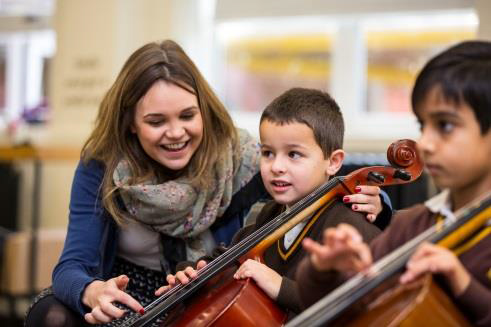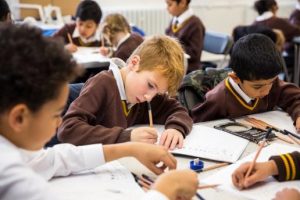
At Cannon Lane Primary School we help each child to achieve their very best. We aim to create a positive and secure environment in which children can be happy, safe, and successful. We place great emphasis on mutual respect and consideration for others. We encourage children to be reflective, resilient, responsible and resourceful learners.
We provide a curriculum that is broad and balanced and one that is relevant and interesting for the children. We believe that children should be inspired by what they are learning and understand how and why this is relevant to them and to their lives in the future.
At Cannon Lane School, our curriculum is designed to:
- challenge all children
- encourage children to ask questions and to develop higher order thinking skills
- be fully inclusive and to celebrate diversity
- motivate children and enable them to become independent learners
- encourage children to take risks and to see mistakes as learning opportunities
- enable children to work together and to learn from each other
- nurture healthy, caring and respectful relationships
- help children to understand how to keep themselves safe
- emphasise important values such as friendship, resilience and compassion
- teach children about the British Values of democracy, rule of law, individual liberty and mutual respect
Throughout the school year visitors are welcomed into school to bring the curriculum to life. Children are encouraged to dress up and experience life as a Roman soldier, an Ancient Egyptian or as a World War II evacuee. Each term children take part in educational visits to further develop their knowledge and understanding of the topics covered in school.Subject Leaders organise ‘themed weeks’ which enable children to immerse themselves fully in their learning. Class assemblies provide an excellent opportunity for children to share their knowledge and enthusiasm with their parents, their peers and their siblings.Please see our Curriculum Map (for each year group) which identifies the topics that children learn each term by subject area.
Download our Curriculum Statement – November 2017 >>
- English
- Mathematics
- Science
- Art and Design
- Computing
- Music
- Religious Education
- Modern Foreign Languages
- Humanities
- Physical Education
- Sex and Relationships Education
- Personal, Social and Health Education
We teach phonics using the Letters and Sounds scheme of work. Phonics teaching starts in Reception and continues until the children are secure in applying their skills to reading. Each day the children are taught a different phonics skill, letter sound or blend and they take part in different activities to practice and consolidate the sounds they have learnt.

All children are encouraged to write creatively and in a variety of different genres, through differentiated teaching. Spelling, punctuation and grammar are taught discretely during all writing opportunities. In Reception and KS1 creative writing and shared writing opportunities are promoted whereby children become keen emergent writers.
In Key Stage 2, writing is more formalised whereby children’s opportunities for extended writing are planned as a ‘Big Write’. Samples of these extended writing outcomes are then used for assessment purposes. At Cannon Lane we endeavour to create fluent and confident readers. We understand that the teaching of reading needs to be delivered in a consistent and rigorous way and we balance our teaching of reading to include explicit teaching of both decoding and comprehension through our delivery of ‘Big Reading.’ Children are taught specific reading skills during weekly, whole class ‘Big Reading’ lessons. These sessions are structured consistently throughout the school in order to teach the children the five key skills of reading (decoding, retrieving, exploring, analysing and deducing and inferring.) We use a wide variety of banded reading books throughout the school. Each reading scheme comprises of both fiction and non-fiction texts, as well as poetry. Once the reading scheme is completed, pupils are encouraged to read novels of interest at their level. Our libraries and class reading corners have a wide range of books that are available for the children to read in school and at home.
The school’s choir learn to sing and to use their voices, to create and compose music on their own and with others. Children understand and explore how music is created, produced and communicated, including through the inter-related dimensions: pitch, duration, dynamics, tempo, timbre, texture, structure and appropriate musical notation.
Download: The Harrow Agreed Syllabus
We ensure every child has the opportunity throughout Key Stage 2 to study a foreign language and develop their interest in the culture of other nations. In Key Stage 2 we teach French in Years 3 & 4 and Mandarin in Years 5 and 6. We have specialist teachers in both languages who deliver lessons to all our pupils.
At Cannon Lane pupils learn about the environment, lives and lifestyles of familiar people in the recent past and about famous people and events in the more distant past, including those from British history.
Children actively study the local features and extend their learning outside their local area to other parts of the UK. Geographical skills such as: use of maps and coordinates, atlas work observations about the weather, climate and outdoor field work prepares children with a sense of empathy and responsibility towards their own environment.
Children take part in games, gymnastics, dance and athletics using the indoor and outdoor environment where appropriate. Children currently swim in Year 4 and receive ‘top up swimming’ in Years 5 and 6 where possible (so that all children are able to swim at least 25 metres by the end of Key Stage 2).
Children also take part in a variety of after school sports clubs and have many opportunities to compete against other local schools.
